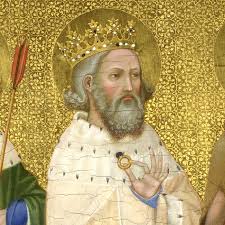Edward the Confessor: England’s Last Anglo-Saxon King

Introduction
Edward the Confessor, reigning from 1042 to 1066, is a pivotal figure in English history, not just as the last Anglo-Saxon king of England, but as a symbol of religious devotion and governance during a transformative period. His life and reign have been widely studied not only for their historical impact but also for their cultural significance, including his canonisation as a saint. Understanding Edward’s legacy provides insight into the foundations of English monarchy and the political landscape that shaped the future of England.
Early Life and Ascension to Power
Born in 1003 to Æthelred the Unready, Edward spent a significant portion of his early life in exile in Normandy due to the Viking invasions that destabilised his family’s rule in England. His return was marked by political manoeuvring, predominantly by the Witan—the council of nobles—and in 1042, he was crowned king following the death of Harthacnut. Edward’s early reign was challenged by internal strife, including rival claims to the throne from the nobility and the influence of powerful earls.
Religious Devotion and Governance
One of Edward’s most notable characteristics was his deep religious faith. He was known for his piety and sought to cement the Church’s influence throughout his reign. His commitment to reforming the Church led to the rebuilding of Westminster Abbey, which became one of the most important religious sites in England. Edward’s rule is often characterised by his attempts to mediate conflicts between various factions within the kingdom, although his authority was frequently undermined by powerful nobles like Earl Godwin.
The Events Leading to the Conquest
Edward’s death in January 1066 set off a chain of events that culminated in the Norman Conquest. Without a clear heir, his passing led to Harold Godwinson being crowned king, a decision that faced immediate opposition from William, Duke of Normandy. William claimed that Edward had promised him the throne and used this as a pretext to invade England later that year. The subsequent Battle of Hastings marked the end of Anglo-Saxon rule and the beginning of Norman influence in England.
Conclusion: Legacy of Edward the Confessor
Edward the Confessor’s impact on England was profound, as he is often seen as a figure representing both the enduring ideals of Anglo-Saxon leadership and the tensions that foreshadowed the Norman Conquest. His canonisation in 1161 further solidified his legacy as a saintly king, blending religious significance with historical reverberations. As England faced a new era of rulership under the Normans, the legacy of Edward’s reign continued to influence English culture, governance, and the monarchy itself. His story is a reminder of how individual reigns can significantly alter the trajectory of a nation.









